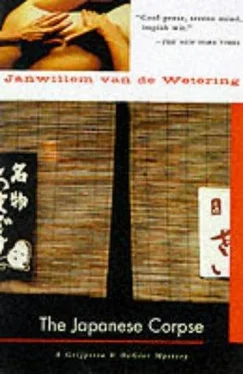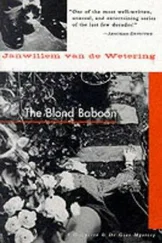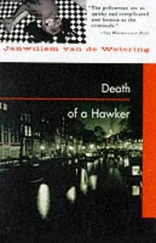Janwillem De Wetering - The Japanese Corpse
Здесь есть возможность читать онлайн «Janwillem De Wetering - The Japanese Corpse» весь текст электронной книги совершенно бесплатно (целиком полную версию без сокращений). В некоторых случаях можно слушать аудио, скачать через торрент в формате fb2 и присутствует краткое содержание. Жанр: Полицейский детектив, на английском языке. Описание произведения, (предисловие) а так же отзывы посетителей доступны на портале библиотеки ЛибКат.
- Название:The Japanese Corpse
- Автор:
- Жанр:
- Год:неизвестен
- ISBN:нет данных
- Рейтинг книги:3 / 5. Голосов: 1
-
Избранное:Добавить в избранное
- Отзывы:
-
Ваша оценка:
- 60
- 1
- 2
- 3
- 4
- 5
The Japanese Corpse: краткое содержание, описание и аннотация
Предлагаем к чтению аннотацию, описание, краткое содержание или предисловие (зависит от того, что написал сам автор книги «The Japanese Corpse»). Если вы не нашли необходимую информацию о книге — напишите в комментариях, мы постараемся отыскать её.
The Japanese Corpse — читать онлайн бесплатно полную книгу (весь текст) целиком
Ниже представлен текст книги, разбитый по страницам. Система сохранения места последней прочитанной страницы, позволяет с удобством читать онлайн бесплатно книгу «The Japanese Corpse», без необходимости каждый раз заново искать на чём Вы остановились. Поставьте закладку, и сможете в любой момент перейти на страницу, на которой закончили чтение.
Интервал:
Закладка:
The commissaris had been listening attentively. So had de Gier and Grijpstra, who watched the girl intently. She spoke softly without changing the tone of her voice. De Gier was reminded of a recorded message.
"The daimyo took him on. The yakusa promised to pay his university fees. Kikuji was admitted the next day, when he applied again. The university director received him in his own office and saw him to the door, bowing and hissing through his teeth. When a Japanese doesn't know what to do he often hisses, or says 'Saaaaah.'"
"What did Mr. Nagai study, miss?" the commissaris asked.
"Art. History of art. He had a very good degree. He specialized in temple art. Buddhist, but also art influenced by Taoism and Hinduism. He even studied the Ainu creations. The Ainu are people who lived all over Japan once, now they only live in the North. They are white and have beards and look like old Russians. Their art has to do with the symbol of the bear. Kikuji liked bears. He always visited zoos and talked to the bears and they talked back to him. But only big brown bears, like the bears in Hokkaido, the northern island of Japan. The daimyo also likes bears. He has some on the grounds of his castle; he plays with them."
"And when Mr. Nagai was graduated? What did he do?"
"He traveled. To Taiwan and Korea and Thailand. He was buying sculptures and paintings. He bought them from priests who were in charge of temples, Buddhist temples mostly. The priests had no right to sell, they were supposed to look after their temples and maintain them, but priests no longer have state incomes and they need money so they would sell to Kikuji."
"And he paid with yakusa money?"
The girl nodded.
"And where did the sculptures and paintings go?"
"To here," the girl said. "He brought them to Amsterdam and would sell them to stores, or have them auctioned. If he had something very special he would go to London, but he always came back to Amsterdam. The yakusa like Amsterdam. It's a quiet city and beautiful and they feel at home here. They have started a restaurant here and they have offices for their legal business. They also own hotels now. My restaurant is yakusa."
"The profit on this stolen art must be high," de Gier said.
"Very high. Often the buying price is multiplied by a hundred."
"What else do the yakusa do here, miss?"
"They sell transistor radios and buy commercial secrets and our restaurant is known for its tempura and sushi."
"Yes," de Gier said, "I have eaten in your place. Tempura are slices of meat or vegetable fried in batter and sushi are cold rice balls with raw shrimps or bits of fish on top. Lovely food but I only went once. The prices are too high. And I didn't see you."
"You must have come on a Friday, it's my night off," the girl said, and smiled. "I am glad you liked the food. The prices are high but we cater to Japanese with expense accounts and then the price never matters."
"Vegetables fried in batter," Grijpstra said, looking interested.
The girl smiled again, and took out a ballpoint and a scrap of paper. She drew some characters and gave Grijpstra the slip. "Give that to the girl at the door," she said. "You will be served well and there will be no bill. You should taste Japanese food; it's a delicate pleasure. But your mind must be at rest. If the food is eaten quickly and without concentration it's just stuffing for the stomach; there's no taste then."
"Thank you," Grijpstra said, and stuck the slip into his wallet. "Do the yakusa sell drugs here, miss?"
"Yes," the girl said, "but only once in a while. Heroin from mainland China, bought through Hong Kong, I believe, in large quantities. The heroin doesn't stay here but goes to the American army in Germany. The deals are carefully planned and I don't know how they are done. Transport must be by sea for I have seen merchant navy officers in the restaurant, Japanese and Dutch. I studied them well and I can describe them."
'That's good," the commissaris said. "Later on I'll get an officer from the drugs department who will ask you some questions. It won't take long. Will that be all right?"
"Yea," the girl said.
"What else, miss?" Grijpstra asked. "Traffic in women?"
The girl smiled sadly. "No, there are enough women in Japan. Even with birth control the farmers have too many daughters. They are contracted to the bars and brothels. There is some demand for white and black women, but the yakusa find them in Hawaii and America and pay them well. The daimyo doesn't like slave traffic; it's too conspicuous because the merchandise talks."
"Art," the commissaris said, "Did your boyfriend sell a lot of Japanese temple art?"
"Not too much. Most of the art sold here came from Thailand and Burma, but some scrolls and sculptures came from Japanese temples, and they were perhaps the most valuable. Buddhism has declined in Japan, although it still has millions of followers, but they follow the Buddist way in name only. The temples are still there of course, but they are not always run by priests, and some priests have had little or no training and are bored and uninterested. They will sell the objects of value entrusted to them, especially now that there is so much demand. Kikuji showed me some pots made by masters, tea ceremony bowls formed by hand hundreds of years ago. They came from a temple and he had paid very little for them. They sold at an auction here for thousands of dollars apiece."
"So why was he killed?" the commissaris asked. "If he was killed. We aren't sure, we have to find the body first. The body may belong to somebody else. Perhaps it is the body of one of the fat little men in your photograph. Perhaps Mr. Nagai is safe in a hotel room in Utrecht and will contact you soon."
She shook her head with such force that her hair bobbed. It had been cut with a simple straightforward line, bringing out her high cheekbones and wide forehead. "No, he is dead. I know. He wanted to leave the yakusa and set up an art store here in Amsterdam. He planned to import his own stock, and buy it legally. He was going to specialize in block prints, antique and reproductions, but the reproductions are made in the old way. They are beautiful, I saw them in Japan. They are made by craftsmen who still know the old ways. They can be sold here at three or four times the buying price. We would have been able to live comfortably. I wanted to manage the store, so that he would have time to buy and to study. His English was good and he wanted to write articles for the art magazines. But the yakusa didn't want to let him go. He asked and they refused. He thought he would be safe in Amsterdam, and he said he wouldn't go back. We were looking for an apartment. They threatened him. They threatened me too, through my boss at the restaurant. They only hinted, but a hint is powerful in Japanese."
"Yes, yes," the commissaris said. He picked up his phone and spoke to the drugs department. A plainclothes constable came to take the girl to another part of the building.
"Phone me at this number when you are through," de Gier said, writing it down for her on a page in his notebook and tearing it out. "I'll check the time of the train and take you to the station."
The commissaris got up and looked at his watch. "Yes," he said to de Gier. "Cardozo can go in the train with her and sit in the next compartment. My niece will collect her at the other end and drive her to the house. What about your luggage, miss?"
"I am leaving it all," the girl said. "I have my money in cash on me. It's a big sum. I was paid good wages and I saved. I can buy new clothes. Will you let me know when my new passport is ready? I have some passport photographs with me."
"Yes," the commissaris said, putting the photographs in his drawer. "It shouldn't take long, you'd better leave your passport with me. I'll give it to the American embassy."
Читать дальшеИнтервал:
Закладка:
Похожие книги на «The Japanese Corpse»
Представляем Вашему вниманию похожие книги на «The Japanese Corpse» списком для выбора. Мы отобрали схожую по названию и смыслу литературу в надежде предоставить читателям больше вариантов отыскать новые, интересные, ещё непрочитанные произведения.
Обсуждение, отзывы о книге «The Japanese Corpse» и просто собственные мнения читателей. Оставьте ваши комментарии, напишите, что Вы думаете о произведении, его смысле или главных героях. Укажите что конкретно понравилось, а что нет, и почему Вы так считаете.












